$50 Million Gift from Marc J. Rowan and Carolyn Rowan for Teaching, Research and Leadership at Wharton
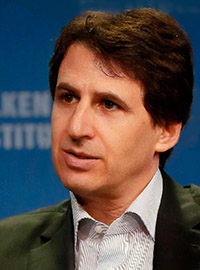 The Wharton School of the University of Pennsylvania announced the largest single gift ever given to the School—$50 million from Marc J. Rowan (W’84, WG’85) and Carolyn Rowan. Their generous funding will enable Wharton to attract and retain world-leading faculty and support the Penn Wharton Budget Model (PWBM), the University’s groundbreaking economic policy analysis program. Mr. Rowan is chair of Wharton’s Board of Overseers, a Penn trustee and co-chair of the School’s More Than Ever fundraising campaign.
The Wharton School of the University of Pennsylvania announced the largest single gift ever given to the School—$50 million from Marc J. Rowan (W’84, WG’85) and Carolyn Rowan. Their generous funding will enable Wharton to attract and retain world-leading faculty and support the Penn Wharton Budget Model (PWBM), the University’s groundbreaking economic policy analysis program. Mr. Rowan is chair of Wharton’s Board of Overseers, a Penn trustee and co-chair of the School’s More Than Ever fundraising campaign.
The Rowans’ gift will enhance Wharton’s ability to address the most complex global challenges and opportunities head on through groundbreaking research and exceptional teaching. With this commitment, Wharton will recruit three Rowan Distinguished Professors who are global leaders in their fields, who will inspire faculty and students alike, and who will build bridges between academia and business. The Rowans’ gift will also support the appointment of a select number of Rowan Fellows for five-year terms to recognize and support Wharton’s most distinguished faculty in their commitment to innovative research and teaching.
Mr. and Mrs. Rowan’s generosity to the Penn Wharton Budget Model, which uses big data analytics to promote evidence-based policymaking on the key economic issues facing the United States, builds upon their foundational commitment to the primacy of societal impact in the Penn Compact 2022.
“With profound gratitude to Marc and Carolyn Rowan, I anticipate the tremendous impact of their philanthropy on the University of Pennsylvania,” said Penn President Amy Gutmann. “Their investment in Penn’s future will strengthen our intellectual resources, provide our students with life-changing mentors, and mobilize our knowledge for the advancement of society.”
“I am deeply grateful for Marc and Carolyn’s extraordinary gift, which reflects their passion to bring to Wharton the most innovative researchers working on the world’s most pressing and important questions,” said Wharton Dean Geoffrey Garrett. “Their commitment is the cornerstone of a campaign that will empower Wharton, more than ever, to create leaders who will change the world.”
“Inspiring Wharton faculty who were committed to cutting edge business education were catalysts for my success,” said Mr. Rowan. “Carolyn and I are honored to join the vision of the Wharton community to bring the School’s outstanding students face to face with the most important thinkers of our time. As top Wharton researchers advance and shape their fields, they transform the lives of their students, preparing them to make a difference in the business world and beyond.”
Contributing to Wharton and Penn since 1984, Mr. and Mrs. Rowan have supported undergraduate and MBA financial aid, faculty, capital projects, the Dean’s fund, Wharton Customer Analytics, The Wharton Fund, the Institute of Contemporary Art, the football program, Penn Medicine’s Basser Center for BRCA and Penn Medicine’s Orphan Disease Center.
Mr. Rowan is a co-founder and Senior Managing Director of Apollo Global Management, LLC, a leading alternative asset manager focused on contrarian and value-oriented investments across private equity, credit-oriented capital markets, insurance and real estate. He graduated summa cum laude from the University of Pennsylvania’s Wharton School with a BS and an MBA in Finance.
Turner Schulman Endowed Research Fund to Support the Center for the Study of Ethnicity, Race and Immigration
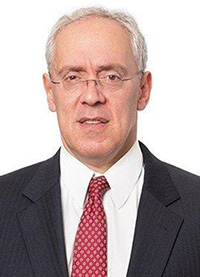
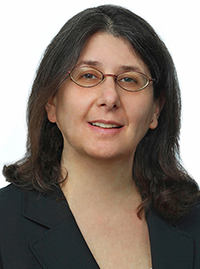 David E. Schulman (C’82, L’85) and Suzanne E. Turner (C’82), Penn parents, have made a gift to create the Turner Schulman Endowed Research Fund in support of the Center for the Study of Ethnicity, Race and Immigration (CSERI). CSERI is led by Michael Jones-Correa, President’s Distinguished Professor of Political Science.
David E. Schulman (C’82, L’85) and Suzanne E. Turner (C’82), Penn parents, have made a gift to create the Turner Schulman Endowed Research Fund in support of the Center for the Study of Ethnicity, Race and Immigration (CSERI). CSERI is led by Michael Jones-Correa, President’s Distinguished Professor of Political Science.
CSERI, based in the School of Arts and Sciences, is a first-of-its-kind research center, focusing on the intersecting narratives of ethnicity, race and immigration in US life and supporting research at the faculty, graduate and undergraduate levels. Support for CSERI is a key priority in the School’s Power of Penn Arts & Sciences campaign.
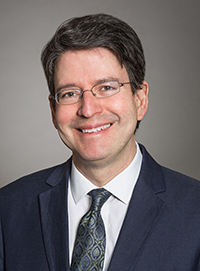 “I am thrilled that David and Suzie share my excitement about CSERI and Professor Jones-Correa’s leadership,” says Steven J. Fluharty, Dean and Thomas S. Gates, Jr. Professor of Psychology, Pharmacology, and Neuroscience. “The Turner Schulman Endowed Research Fund will allow students to pursue research that matters to them and to all of us invested in greater global understanding.”
“I am thrilled that David and Suzie share my excitement about CSERI and Professor Jones-Correa’s leadership,” says Steven J. Fluharty, Dean and Thomas S. Gates, Jr. Professor of Psychology, Pharmacology, and Neuroscience. “The Turner Schulman Endowed Research Fund will allow students to pursue research that matters to them and to all of us invested in greater global understanding.”
“We are delighted to support student research at CSERI and to strengthen the School’s commitment to this interdisciplinary hub on campus,” said Mr. Schulman. “This research is especially meaningful to us—I am the son of a French immigrant and Suzie has dedicated her career to advancing civil rights.”
Ms. Turner added, “For generations, Penn has been the place where our family grows our knowledge and deepens our understanding of complex ideas. We’re pleased to create research and learning opportunities for students and to help Penn grow as a leader in this vital field.”
Ms. Turner and Mr. Schulman are partners at Dechert in Washington, DC, where Ms. Turner is chair of the firm’s pro-bono practice.
Ms. Turner and Mr. Schulman previously created the Turner Schulman Scholarship for undergraduates in the College of Arts and Sciences, with a preference for students who have demonstrated a strong interest in public service, and the Turner Schulman Internship, which provides financial support for college students interning with human rights organizations.
Daniel Mindiola: Brush Family Professor of Chemistry
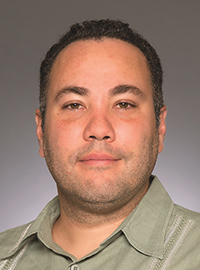 Daniel Mindiola, professor of chemistry, has been named Brush Family Professor of Chemistry. An internationally recognized inorganic chemist, Dr. Mindiola was a Presidential Professor from 2013 until July 2018. His research focuses on the design and assembly of reactive metal complexes of early metals and their role in unusual transformations such as the conversion of natural gas to more value-added materials with zero emissions and under mild conditions.
Daniel Mindiola, professor of chemistry, has been named Brush Family Professor of Chemistry. An internationally recognized inorganic chemist, Dr. Mindiola was a Presidential Professor from 2013 until July 2018. His research focuses on the design and assembly of reactive metal complexes of early metals and their role in unusual transformations such as the conversion of natural gas to more value-added materials with zero emissions and under mild conditions.
Dr. Mindiola’s many professional honors include the Presidential Early Career Award and the Faculty Early Career Development Award from the National Science Foundation, the Teacher-Scholar Award and New Faculty Award from the Camille and Henry Dreyfus Foundation, the Fresenius Award from the American Chemical Society, and the Bessel Research Award from the Humboldt Foundation. He is also the recipient of fellowships from the National Institutes of Health, the Ford Foundation, Sloan Foundation and Guggenheim Foundation, and he is a fellow of the Royal Society of Chemistry and the American Association for the Advancement of Science.
The Brush Family Professorship was established in 2008 by Karen Clark Brush (W’82) and David M. Brush (C’82). Mr. Brush is currently chief investment officer for MERLIN Properties in Spain. At Penn, he has served as a member of the Board of Trustees, on the Board of Overseers of the School of Arts and Sciences, and the Penn Alumni Board of Directors. He is currently chair of the Penn Soccer Executive Board and an Athletic Overseer, as well as a member of the UK Leadership Committee, where he formerly served as chair. The Brushes have generously supported Penn, including capital projects, athletics and undergraduate scholarships.
2017-2018 Report of the Office of the Ombuds
Lynn Hollen Lees, University Ombuds
The purpose of the Office of the Ombuds is to help members of the Penn community who are experiencing problems or conflict related to their work, academic or living experiences at the University. We offer mediation services with the aim of helping individuals resolve differences. Our door is open equally to students, staff and faculty, and we work to resolve the issues that are troubling them. The principles that guide our interactions with visitors are described on our website and can be summarized as follows:
- Confidentiality. We do not discuss visitors’ concerns or issues with others, unless given permission.
- Neutrality. We do not take sides in a dispute.
- Informality. We do not keep records of our conversations with visitors, and we do not carry out formal investigations.
- Independence. The Ombuds Office is not bound by established reporting procedures and administrative hierarchies. We have the freedom to raise issues throughout the University.
During the past academic year, 163 individuals from across the University consulted our office. This represents an increase of 5.8% in comparison with the academic year 2016-2017. Visitors to the Ombuds Office represented all parts of the University community, with the highest proportions being staff (39.9%), followed by faculty (30.0%), graduate and professional students (17.2%), and undergraduate students (9.2%). See Table 1. Most come as individuals, although an increasing number of groups of people have visited during the past two years to talk about common problems and their proposed resolutions.
Table 1: Visitors by Affiliation 2017-2018
| Faculty |
30% |
49 |
| Graduate/Professional |
17% |
28 |
| Undergraduate |
9% |
15 |
| Staff |
40% |
65 |
| Post-Doctorates |
2% |
3 |
| Other |
2% |
3 |
| TOTAL |
100% |
163 |
The issues brought to us are highly varied, although many concerns recur every year. Faculty raise questions about contract renewals, promotions and denials of tenure, largely challenging the fairness of procedures. Staff generally are concerned about a lack of clarity in job expectations and duties which leads to questions about their performance reviews. Graduate students sometimes have problems with leaves of absence or with advisors. While we do not report the substance of individual cases, we classify complaints in broad groups, using the same system every year for comparability. Most issues brought to us concern matters relating to employment (42%) or academic issues (21%). See Table 2. Table 3 gives more detailed information on the issues raised, listing categories, their definitions and the numbers of complaints.
Table 2: Visitors by Issues Raised 2017-2018
| Academic Related |
21% |
35 |
| Employment Related |
42% |
68 |
| Bias/Abuse/Discrimination |
27% |
44 |
| Other |
10% |
16 |
| TOTAL |
100% |
163 |
During the past two years, visitors have raised more complex issues, and we welcome the opportunity to assist individuals and groups in their efforts to clarify problems. We are glad for the growing awareness of services offered by the Ombuds Office. Several departments have raised concerns with us about disputes and issues relating to working relationships between colleagues within the department. We have offered to mediate or to facilitate conversations among the individuals concerned or within an entire unit. These group conversations have proven to be a valuable way to explore responses to common challenges.

For the past several years, the most common complaint brought to us arises from resentments over what is seen as bullying and unfair treatment. Visitors describe intimidation, abusive language and disrespectful behavior, as well as the unwillingness of others to engage in dialogue about an issue. Visitors report their perceptions of biases and micro-aggressions. While some visitors question the substance of a decision or policy, most often they complain about the manner in which it was communicated or applied. The fear of retaliation hinders many from raising these concerns directly with a supervisor or with colleagues. There is a need for greater civility within offices, labs and other units, as well as greater clarity about rules and procedures. Higher standards for respectful behavior and courteous communication should be set for the well-being of our community. There is now a website where individuals can report incidents of bias and harassment. Additionally, the Office of Audit, Compliance and Privacy maintains both a website and the 215-P-Comply hotline for the registering of concerns. During the past two years, after the University designation of the Ombuds Office as a confidential resource in matters involving sexual harassment and sexual violence, we have seen a clear increase in the number of cases relating to these issues. More and more individuals have come to the Ombuds Office to explore their options and seek information about the consequences of particular choices before they decide what to do. As federal, state and local guidance shifts, understanding current policies and laws becomes ever more important. Since we are a confidential resource, visitors can discuss their concerns without worrying that they will be discussed with others without their permission.
Graduate and professional students have raised multiple problems linked to their academic programs and relationships with faculty and departmental administrators. We have been able to help them prioritize their issues and to facilitate intradepartmental conversations on substantive questions. In many cases, resolution of disputes has been made more difficult because of the lack of comprehensive, written procedures. Even if such documents have been created, they can be out-of-date and not publicized adequately. We welcome the initiative of the Vice Provost for Education whose Office has just published Advising & Mentoring PhD Students, which lays out the roles and responsibilities of faculty and graduate students. While departments and schools should still have specific written policies covering graduate and professional education, this guidance provides general standards and expectations for reference throughout the University. We encourage everyone involved in graduate and professional education, especially all graduate and professional students and members of the faculty to read and circulate it within their units.
The University of Pennsylvania has a stated policy of providing access and equal educational opportunities to all students, including students with disabilities. For a reasonable accommodation to be provided, however, students must identify themselves to the Office of Student Disability Services and provide appropriate documentation. Too often, we see students who have not requested an accommodation in a timely fashion and who only come forward after experiencing an academic setback. We also have heard expressions of concern about a perceived lack of transparency and the length of time the process of reviewing and deciding upon accommodation requests can take. The Office of the Vice Provost for University Life is aware of these issues, and we look forward to continuing conversations about this concern as part of Penn’s commitment to health and wellness across the campus.
We are sometimes asked about what services the Ombuds Office offers, so starting in November 2017, we refined the categories for tracking the types of assistance that we provide. We start by listening respectfully to visitors concerns and by allowing them to articulate frustrations and fears. As Table 4 shows, we regularly help individuals explore their options, identify their priorities and understand the different channels that exist to help them resolve their complaints. We locate and explain relevant Penn policies and procedures. After a visit, we often make additional inquiries to collect information and then relay that information back to our visitors. Frequently, we coach individuals on how to handle difficult conversations. While we do not serve as advocates, we help individuals as they seek to resolve problems. Marcia Martínez-Helfman, the associate ombuds, is a trained mediator, and we offer both shuttle diplomacy and informal mediation among the involved parties. The Ombuds Office often serves as the beginning point of an inquiry, and we regularly refer visitors to other offices and resources, both at Penn and off-campus. Contacting the ombuds is often the first step in a process that becomes more focused as an individual chooses which path to pursue.

The Ombuds Office advocates for fairness and consistency across the University. The Ombuds Office keeps neither the names of visitors nor written records. Those who wish to speak with us may do so without providing names or other identifying information if they so choose. When we see a pattern of problematic actions, we raise it with University administrators. Although we do not have the authority to set Penn policies or to change specific decisions, we have the duty to bring concerns to the attention of the appropriate authority, and we regularly do so.
The Ombuds Office is located in 113 Duhring Wing adjoining the Fisher Fine Arts Library in the center of campus. We can be reached by phone at (215) 898-8261 or at www.upenn.edu/ombuds between 9 a.m. and 5 p.m., Monday through Friday and by appointment. Please contact the Office or consult our website for more information. We respond to inquiries quickly, and we urge anyone experiencing difficulties with any aspect of their life in the Penn community to schedule an appointment with us.
Pamela Cacchione: Penn Nursing Innovation Fellow
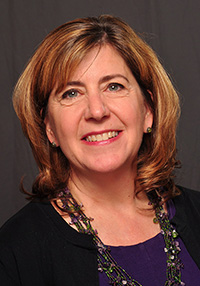 The University of Pennsylvania School of Nursing’s Pamela Cacchione, the Ralston House Endowed Term Chair in Gerontological Nursing and a Nurse Scientist at Penn Presbyterian Medical Center, has been appointed a 2018-2019 Penn Nursing Innovation Fellow. As an innovation fellow in the Penn Medicine Center for Health Care Innovation (CHCI), Dr. Cacchione will engage in multidisciplinary collaborations using innovation and design thinking to enhance health care delivery and outcomes.
The University of Pennsylvania School of Nursing’s Pamela Cacchione, the Ralston House Endowed Term Chair in Gerontological Nursing and a Nurse Scientist at Penn Presbyterian Medical Center, has been appointed a 2018-2019 Penn Nursing Innovation Fellow. As an innovation fellow in the Penn Medicine Center for Health Care Innovation (CHCI), Dr. Cacchione will engage in multidisciplinary collaborations using innovation and design thinking to enhance health care delivery and outcomes.
Dr. Cacchione has collaborated with investigators from the School of Engineering and Applied Science and the Perelman School of Medicine on a National Science Foundation-funded grant to develop affordable mobile robots to help with elderly care. She and a team of engineering design students developed a prototype of heart failure monitoring Smart Socks.
The fellowship represents an important collaboration between the Penn School of Nursing, CHCI, and the department of nursing from the University of Pennsylvania Health System. It was formally launched in January 2017 to foster multidisciplinary collaboration by enabling fellows to work directly with designers, developers and innovation specialists from the CHCI over the course of a semester. The Penn Nursing Innovation Fellows learn disciplined techniques for testing potentially value-producing ideas faster, less expensively and more reliably. These skills will enable them to drive change in health care within Penn Medicine and at the local, state and national levels.
IADR/IAP Research Award Honoring Legacy of Ricardo Teles
A new research award has been established by the International Academy of Periodontology (IAP) and offered through the International Association for Dental Research (IADR) Periodontal Research Group (PRG). It recognizes the contributions to the field of clinical periodontal research of Ricardo Teles, former professor and former chair of Penn Dental Medicine’s department of periodontics who died in December 2017 (Almanac December 19, 2017).
The new IADR/IAP Ricardo Teles Clinical Research Award in Periodontology will be given annually to recognize a clinical research paper accepted for publication or published during the preceding year. One paper reporting the results of a clinical study will be selected in the categories of onset, progression or treatment of periodontal diseases.
The main judging criteria will be relevance/importance of the clinical research for improving knowledge about periodontal disease etiology, pathogenesis and treatment. The award will be presented during the annual business meeting of the PRG at the IADR General Session & Exhibition.
“It’s a beautiful tribute that will help perpetuate his legacy and continue to inspire clinical scientists in the field for years to come,” said Dr. Flavia Teles, associate professor, department of microbiology at Penn Dental Medicine and Dr. Teles’ wife. “I am thankful to the PRG and IAP, and to our long-time friend and collaborator Dr. Magda Feres, IAP and PRG president, who spearheaded the initiative.”
The first awards will be presented in 2019 with an application deadline of March 31, 2019. Complete submission criteria and guidelines can be found at www.iadr.org/IADR/Awards/Scientific-Group-Awards/PERIO/RT
 The Wharton School of the University of Pennsylvania announced the largest single gift ever given to the School—$50 million from Marc J. Rowan (W’84, WG’85) and Carolyn Rowan. Their generous funding will enable Wharton to attract and retain world-leading faculty and support the Penn Wharton Budget Model (PWBM), the University’s groundbreaking economic policy analysis program. Mr. Rowan is chair of Wharton’s Board of Overseers, a Penn trustee and co-chair of the School’s More Than Ever fundraising campaign.
The Wharton School of the University of Pennsylvania announced the largest single gift ever given to the School—$50 million from Marc J. Rowan (W’84, WG’85) and Carolyn Rowan. Their generous funding will enable Wharton to attract and retain world-leading faculty and support the Penn Wharton Budget Model (PWBM), the University’s groundbreaking economic policy analysis program. Mr. Rowan is chair of Wharton’s Board of Overseers, a Penn trustee and co-chair of the School’s More Than Ever fundraising campaign.

 David E. Schulman (C’82, L’85) and Suzanne E. Turner (C’82), Penn parents, have made a gift to create the Turner Schulman Endowed Research Fund in support of the Center for the Study of Ethnicity, Race and Immigration (CSERI). CSERI is led by Michael Jones-Correa, President’s Distinguished Professor of Political Science.
David E. Schulman (C’82, L’85) and Suzanne E. Turner (C’82), Penn parents, have made a gift to create the Turner Schulman Endowed Research Fund in support of the Center for the Study of Ethnicity, Race and Immigration (CSERI). CSERI is led by Michael Jones-Correa, President’s Distinguished Professor of Political Science. “I am thrilled that David and Suzie share my excitement about CSERI and Professor Jones-Correa’s leadership,” says Steven J. Fluharty, Dean and Thomas S. Gates, Jr. Professor of Psychology, Pharmacology, and Neuroscience. “The Turner Schulman Endowed Research Fund will allow students to pursue research that matters to them and to all of us invested in greater global understanding.”
“I am thrilled that David and Suzie share my excitement about CSERI and Professor Jones-Correa’s leadership,” says Steven J. Fluharty, Dean and Thomas S. Gates, Jr. Professor of Psychology, Pharmacology, and Neuroscience. “The Turner Schulman Endowed Research Fund will allow students to pursue research that matters to them and to all of us invested in greater global understanding.” Daniel Mindiola, professor of chemistry, has been named Brush Family Professor of Chemistry. An internationally recognized inorganic chemist, Dr. Mindiola was a Presidential Professor from 2013 until July 2018. His research focuses on the design and assembly of reactive metal complexes of early metals and their role in unusual transformations such as the conversion of natural gas to more value-added materials with zero emissions and under mild conditions.
Daniel Mindiola, professor of chemistry, has been named Brush Family Professor of Chemistry. An internationally recognized inorganic chemist, Dr. Mindiola was a Presidential Professor from 2013 until July 2018. His research focuses on the design and assembly of reactive metal complexes of early metals and their role in unusual transformations such as the conversion of natural gas to more value-added materials with zero emissions and under mild conditions.

 The University of Pennsylvania School of Nursing’s Pamela Cacchione, the Ralston House Endowed Term Chair in Gerontological Nursing and a Nurse Scientist at Penn Presbyterian Medical Center, has been appointed a 2018-2019 Penn Nursing Innovation Fellow. As an innovation fellow in the Penn Medicine Center for Health Care Innovation (CHCI), Dr. Cacchione will engage in multidisciplinary collaborations using innovation and design thinking to enhance health care delivery and outcomes.
The University of Pennsylvania School of Nursing’s Pamela Cacchione, the Ralston House Endowed Term Chair in Gerontological Nursing and a Nurse Scientist at Penn Presbyterian Medical Center, has been appointed a 2018-2019 Penn Nursing Innovation Fellow. As an innovation fellow in the Penn Medicine Center for Health Care Innovation (CHCI), Dr. Cacchione will engage in multidisciplinary collaborations using innovation and design thinking to enhance health care delivery and outcomes.-resized.jpg) Harry Joseph James Cusick, a nationally recognized critical incident and disaster management executive and former director of Penn’s Fire and Occupational Safety Department (now Fire and Emergency Services), died September 17. He was 73.
Harry Joseph James Cusick, a nationally recognized critical incident and disaster management executive and former director of Penn’s Fire and Occupational Safety Department (now Fire and Emergency Services), died September 17. He was 73.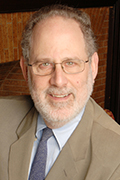 David Hollenberg (MArch’75), adjunct professor in the University of Pennsylvania School of Design and former University architect, has received the 2018 John Frederick Harbeson Award from the American Institute of Architects Philadelphia Chapter.
David Hollenberg (MArch’75), adjunct professor in the University of Pennsylvania School of Design and former University architect, has received the 2018 John Frederick Harbeson Award from the American Institute of Architects Philadelphia Chapter.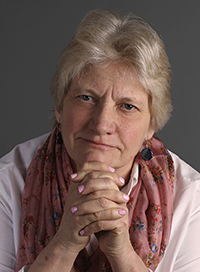 Susan K. Weiler, lecturer in PennDesign’s department of landscape architecture and partner at OLIN, has received the Philadelphia chapter’s 2018 Paul Philippe Cret Award. This award recognizes individuals or organizations who are not architects but who have made an outstanding and lasting contribution to the design of buildings, structures, landscapes and the public realm of Greater Philadelphia. Ms. Weiler has risen to prominence in the field of landscape architecture as a designer, speaker, teacher and writer. She is the lead author of Green Roof Systems: A Guide for the Planning, Design and Construction of Landscapes over Structure, a primary resource on the topic of green roof design for landscape architects, architects, engineers and sustainably conscious municipal leaders. She has applied her expertise in interfacing with complex engineering systems and construction technologies over more than 30 years to projects like the US Embassy in Berlin; Mission Bay Master Planning and development in San Francisco; and the LDS Conference Center in Salt Lake City.
Susan K. Weiler, lecturer in PennDesign’s department of landscape architecture and partner at OLIN, has received the Philadelphia chapter’s 2018 Paul Philippe Cret Award. This award recognizes individuals or organizations who are not architects but who have made an outstanding and lasting contribution to the design of buildings, structures, landscapes and the public realm of Greater Philadelphia. Ms. Weiler has risen to prominence in the field of landscape architecture as a designer, speaker, teacher and writer. She is the lead author of Green Roof Systems: A Guide for the Planning, Design and Construction of Landscapes over Structure, a primary resource on the topic of green roof design for landscape architects, architects, engineers and sustainably conscious municipal leaders. She has applied her expertise in interfacing with complex engineering systems and construction technologies over more than 30 years to projects like the US Embassy in Berlin; Mission Bay Master Planning and development in San Francisco; and the LDS Conference Center in Salt Lake City.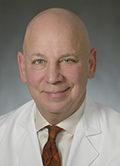 Penn Medicine’s L. Scott Levin, the Paul B. Magnuson Professor of Bone and Joint Surgery, chair of the department of orthopedic surgery, and a professor of plastic surgery, has been elected President of the American Society for the Surgery of the Hand (ASSH). Dr. Levin was introduced as president on September 15, during the organization’s 73rd annual meeting in Boston. He will serve in this role through 2019.
Penn Medicine’s L. Scott Levin, the Paul B. Magnuson Professor of Bone and Joint Surgery, chair of the department of orthopedic surgery, and a professor of plastic surgery, has been elected President of the American Society for the Surgery of the Hand (ASSH). Dr. Levin was introduced as president on September 15, during the organization’s 73rd annual meeting in Boston. He will serve in this role through 2019.
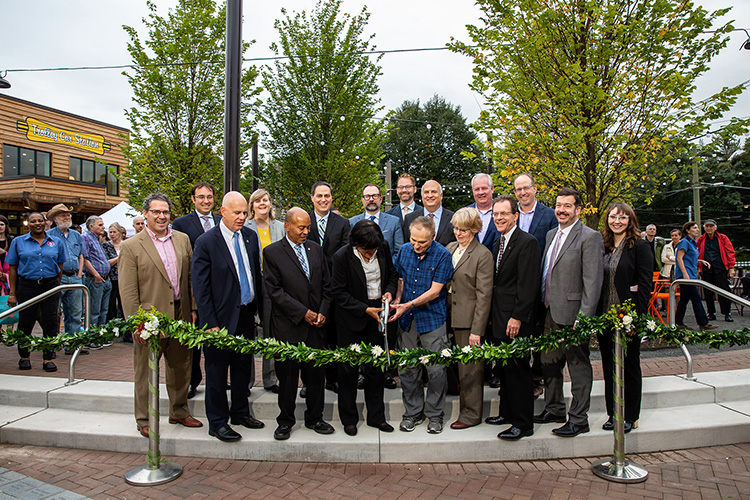


 The Penn Sustainability Office invites the Penn community to come together for its annual ReThink Your Footprint campaign to promote waste minimization efforts. ReThink Your Footprint raises awareness of already-established waste minimization programs and initiatives in this area, inspires students, staff and faculty to create new activities related to source reduction and recycling and encourages everyone to rethink their footprint.
The Penn Sustainability Office invites the Penn community to come together for its annual ReThink Your Footprint campaign to promote waste minimization efforts. ReThink Your Footprint raises awareness of already-established waste minimization programs and initiatives in this area, inspires students, staff and faculty to create new activities related to source reduction and recycling and encourages everyone to rethink their footprint.

